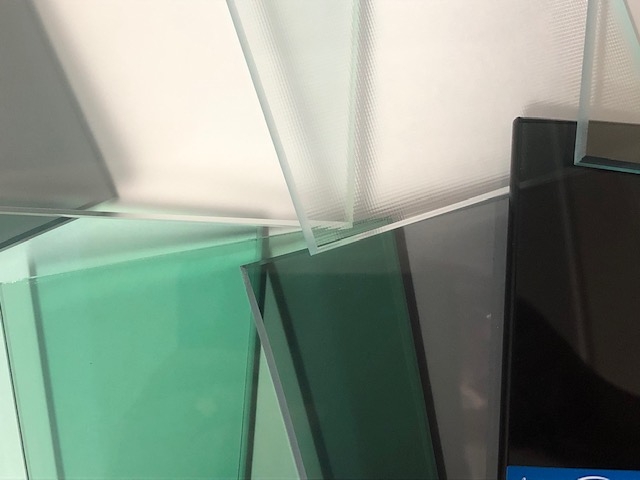Introduction
The thickness and type of glass used in windows and doors are generally determined by design criteria, performance and building codes.
Most standard residential windows are fitted with clear float glass, in thickness ranging from 3-5mm. Doors are generally fitted with 4mm or 5mm clear toughened glass.
In some instances, such as in bathrooms, doors, stairwells, or where a large window can be mistaken as a door opening, the Australian Standards require Grade A safety glass to be used. We can assist you with where this is required.

Types of Glass
The correct choice of glass can assist you to maximise natural light while minimising heat and glare, or reducing heat loss during winter. Correct glass also helps to reduce energy bills, improve security, reduce UV fading of furnishings and reduce noise.
Glass options for your windows and doors include:
| Float | The most common type of glass. When broken it shatters into slivers. |
| Toughened | Grade A safety glass that is 5 times stronger than normal glass. It is heat treated for extra strength. When broken it breaks into small granules. It is used in glass doors unless otherwise specified. |
| Laminated | Grade A safety glass that is made up of two pieces of float glass separated by a special membrane, giving extra strength. When broken, the membrane holds the glass together. Laminated glass in windows and doors is typically 6.38mm thick. Laminated glass lowers the UV transmission and reduces noise. |
| Toned | Grey, green and dark grey are the most popular toned glass. It reduces the heat transfer and glare. The glass absorbs the heat and then radiates it both inside and outside. |
| Obscure | Obscure glass is used for privacy, most commonly in bathrooms and toilets. There are several types of obscure glass you can choose: Satinlite is our standard obscure glass. Satina (also known as Decore Satin or Acid Etch Glass) is also popular. |
| Smart Glass | Smart glass has a low E coating on the internal face of the glass. This glass is used for insulation purposes. The heat or cold is reflected back. Smart glass comes in clear, neutral or grey. Smart glass can be toughened. |
| Comfort Plus | Comfort Plus is a laminated glass with a low E coating. |
| Double Glazed | Double glazed windows have 2 pieces of glass separated by an air pocket for superior insulation and noise reduction. We do not sell double glazed products. For insulation, consider using Smart Glass or Comfort Plus as an alternative. Choose a laminated glass to help with noise reduction (not as good as double glazing but is cost effective improvement). |
Glass Selection
Selecting the best glass for your project is often confusing. Focusing on what you are trying to achieve will help guide you in the right direction. Our Glass Decision Table lists the main glass choices with a rating against the following criteria:
Clear glass gives us the best natural light into the room. Green glass also lets a lot of natural light through and gives the landscape a vibrant look while also having some of the heat reduction properties.
Examples of toned glass are: Grey Glass, Dark Grey Glass, Green Glass or Neutral Glass. (All have different performances)
“Typically, toned glass is the most suitable for reducing solar heat gain, but it also tends to reduce the amount of natural light entering your space.” (Viridian website)
A Low E coating on the glass is used for insulation. The measure for this is the U Value which measures the rate of heat gain or loss through glazing due to the environmental differences between outdoor and indoor air. To reduce the loss of air conditioning / heating, the lower the U value the better.
Smartglass and Comfortplus glass have Low E coating. They come in Clear, Grey, or Neutral.
“Low E coating reflects heat back to its source instead of absorbing it.” (Viridian website)
Laminate glass reduces 99% of UV transmission. This helps to reduce your furniture fading.
In relation to noise … “We should note that glass may not be the only problem. Any opening in the roof or walls of the building – such as vents or construction gaps – provide a simple entry point for noise. In the same way, windows and doors which do not seal well will allow noise to pass around their frames. A thorough assessment of the entire building is advisable to make sure the weakest links are being dealt with first and foremost” (Viridian website)
Obscure glass is used for privacy. There are several types of obscure glass products. The most popular are Satinlite, Satina (also called Decore Satin or Acid Etch Glass) and Translucent Laminate.
Cost is often a factor in choosing the type of glass in your windows and doors. As with everything, the better the product, the more costly it is going to be. So, if you work out what you really need, you can choose an appropriate glass without having to get the best. To help with your decision we have added an Extra Cost % based on a 1200 x 1800 window to our Glass Decision Table so you can get an idea on the cost variation while making your choice.
Further information
For further information, please call us on 3343 7988. We are happy to help. If you have a SHGC and U value that you need to achieve for your energy ratings, we can look up the actual numbers and make sure the product will rate for you.